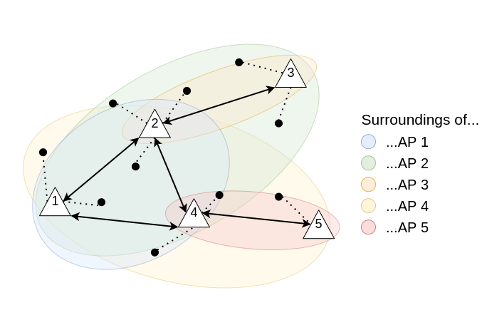Publication of the LIP in the ACM MSWiM Conference proceedings on October 24, 2022. Communication of the CNRS-INS2I on April 14, 2023.
"This site can't be reached, check your Internet connection". Who has never complained about his WiFi network? In order to provide a more reliable (and therefore less frustrating) wireless access to the Internet, Anthony Bardou, PhD student at ENS de Lyon and Thomas Begin, Professor at Claude Bernard Lyon 1 University, both members of the Parallel Computation Laboratory (LIP - CNRS/ENS de Lyon/Claude Bernard Lyon 1 University), have developed an algorithm that allows a WiFi network to adapt to its environment by learning to self-configure through trial and error. After only a few seconds of testing, WiFi networks implementing this algorithm show a much higher throughput, more evenly distributed among users. Work presented at the 25th International ACM Conference on Modeling Analysis and Simulation of Wireless and Mobile Systems (MSWiM '22) and published in the conference proceedings.
Abstract
WLANs, which have overtaken wired networks to become the primary means of connecting devices to the Internet, are prone to performance issues due to the scarcity of space in the radio spectrum. As a response, IEEE 802.11ax and subsequent amendments aim at increasing the spatial reuse of a radio channel by allowing the dynamic update of two key parameters in wireless transmission: the transmission power (TX_POWER) and the sensitivity threshold (OBSS_PD). In this paper, we present INSPIRE, a distributed online learning solution performing local Bayesian optimizations based on Gaussian processes to improve the spatial reuse in WLANs. INSPIRE makes no explicit assumptions about the topology of WLANs and favors altruistic behaviors of the access points, leading them to find adequate configurations of their TX_POWER and OBSS_PD parameters for the ''greater good" of the WLANs. We demonstrate the superiority of INSPIRE over other state-of-the-art strategies using the ns-3 simulator and two examples inspired by real-life deployments of dense WLANs. Our results show that, in only a few seconds, INSPIRE is able to drastically increase the quality of service of operational WLANs by improving their fairness and throughput.

credits: Bardou/Begin
Reference: INSPIRE: Distributed Bayesian Optimization for ImproviNg SPatIal REuse in Dense WLANs. Anthony Bardou and Thomas Begin. MSWiM '22: Proceedings of the 25th International ACM Conference on Modeling Analysis and Simulation of Wireless and Mobile Systems, October 24, 2022.
DOI: 10.1145/3551659.3559050






